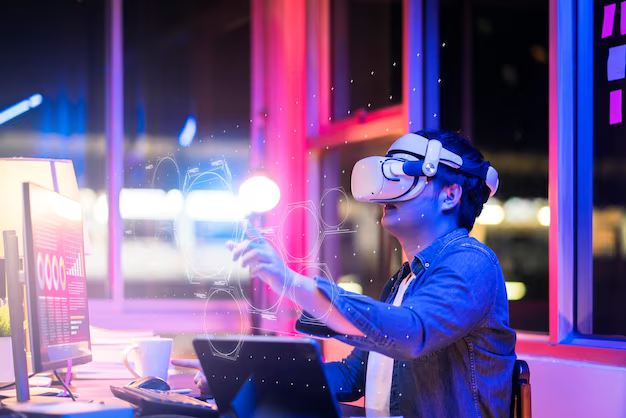As the virtual universe beckons, marketing as we conceive it is poised to morph into a digitized space unparalleled in its potential. The Metaverse has emerged as a major player in the evolution of marketing strategies, with experts anticipating it to be the next game-changer in the industry. This digital reality has vast untapped potential to transform how brands interact with their audiences and market their products or services.
One significant aspect of leveraging this digital dimension for marketing is the introduction of brand characters. A unique and impactful brand character can increase your visibility and reach in the virtual spaces that the Metaverse offers. But how can we truly harness the power of a brand character in the Metaverse? Let’s delve into the details.
Unraveling the Concept of Brand Characters: Their Impact and Importance
Brand characters, often interchangeably referred to as mascots, are symbolic figures representative of a group, business or organization. They come in various forms – humans, animals, or even objects, chosen for their potential to mirror the brand’s values and evoke a sense of affinity among customers. These figural embodiments are no less than messengers for a brand, delivering its core message, inherent values, and social commitments in an engaging and relatable way.
Serving as the cohesive bond linking a brand’s identity and its consumers, these characters make the brand more approachable, fostering open communication and facilitating interaction.
Brand Characters: A Mirror to a Business’s Essence
A brand character serves as a reflective surface, mirroring the business’s core values and beliefs. It doesn’t just increase brand recognition, but acts as the brand’s voice, conveying its ethics, emotions, and tonality. However, the significance of having a brand character extends beyond mere branding tactics. It enters the intriguing realm of psychology, where the personified figure begins to influence consumers’ perceptions and behaviors.
Here’s how:
- Increasing Brand Recognition: A distinctive brand character can make a brand instantly recognizable among a sea of competitors. It becomes a visual cue associated with the brand, strengthening its overall identity;
- Boosting Sales: As the brand character connects with the audience on an emotional level, it can lead to increased brand loyalty, repeat purchases, and consequently, higher sales;
- Establishing Brand Tone: The character helps set the tonality of the brand. Whether it’s humorous, serious, or adventurous, the character’s persona translates into the brand’s tone, shaping its communication strategy.
The Psychological Impact of Brand Characters
Brand characters weave a fascinating psychological narrative. The personified figure appeals to the human tendency to attribute human characteristics to non-human entities, a phenomenon known as anthropomorphism. By embodying human-like qualities, the brand character elicits emotional responses, fostering deeper connections with the audience. This psychological interplay can significantly influence consumers’ purchasing decisions.

The Birth of the Metaverse: A New Frontier in Digital Interaction
The Metaverse is a buzzword that has captured the attention of digital enthusiasts worldwide. However, before diving into its implications, it’s essential to understand its roots and what it intends to signify. The term “Metaverse” is a fusion of Greek derivative ‘meta,’ meaning ‘beyond,’ and ‘universe,’ implying a ‘world.’ Coined by Neil Stephenson in his 1992 science fiction novel “Snow Crash,” the term encapsulates the concept of a universe that exists beyond our physical reality.
The Metaverse, in its essence, is poised to revolutionize the Internet as we know it, offering a more immersive and integrated online experience with fewer restrictions on access. It promises to remove the barriers that currently limit cross-platform operability on the Internet.
While prevailing online platforms allow users to engage within specific landscapes, they impose limitations on cross-platform interactions. To illustrate, imagine creating an elaborate structure in Minecraft – today’s digital landscape prevents you from exporting your creation to another platform like Fortnite. However, the Metaverse is set to dismantle these restrictive walls.
The Promise of the Metaverse: A Seamless Digital Existence
The Metaverse aims to offer a meta virtual realm where individuals can create content on any platform and freely distribute it across the digital world in a seamless, unrestricted manner. It aspires to bring about a paradigm shift in the digital interaction landscape, fostering a truly interconnected and boundless digital universe.
Metaverse: A Vision for the Future
Our current digital interactions are fragmented, housed within separate applications and platforms. The Metaverse envisions a future where these interactions are unified, functioning harmoniously within a singular digital expanse. The implications of such a transformation are profound, with potential impacts on socializing, gaming, shopping, and even the methods businesses use to reach their customers.
Metaverse Marketing: Charting a New Course in the Marketing Landscape
Marketing, just like the world around us, is in a constant state of flux. As digital technology continues to evolve, so do the approaches businesses employ to reach their customers. One such groundbreaking shift is being ushered in by the Metaverse, a digital universe that transcends geographical boundaries and holds unprecedented potential for innovative marketing strategies.
Some of the most recognized corporations globally have already started harnessing the Metaverse’s opportunities. They are weaving an impactful digital presence within this expansive universe and positioning themselves at the forefront of this marketing revolution.
In a nod to the meteoric rise of the Metaverse, Facebook embarked on a transformative journey in 2021, rebranding itself as Meta. This historic move sparked a global surge in interest towards the Metaverse, skyrocketing the search volumes of related keywords. “Metaverse Marketing” emerged as one of the most searched-for terms, reflecting the burgeoning interest in this domain.
Brands Making Waves in the Metaverse
Today, an increasing number of brands are exploring innovative ways to establish their foothold in the Metaverse. Tactics range from purchasing virtual land for immersive digital experiences and developing Non-Fungible Tokens (NFTs) for their products, to partnering with blockchain-based gaming platforms like Roblox.
By charting their course in the Metaverse, brands are not just leveraging cutting-edge technology, but they’re also capitalizing on the opportunity to interact with their consumers in an immersive, engaging, and highly personalized manner.
Leading Brands Embracing the Metaverse: A Peek into Future Marketing Strategies
In an ever-evolving digital landscape, brands are continually seeking innovative ways to engage with their audience, and the Metaverse has emerged as a promising frontier. Here we delve into brands that have begun to leverage the Metaverse’s vast potential for marketing, breaking new grounds in customer engagement.
Microsoft
The tech giant has been vocal about its Metaverse ambitions. As stated by CEO Satya Nadella, the Metaverse is viewed not just as a reimagined world, but as a playground for interactive experiences. The company’s ambitious project, Mesh for Microsoft Teams, launched at the Ignite conference in 2021, aims to foster collaborative interactions within the Metaverse.
Disney
Known for its immersive experiences, Disney plans to take the magic to the Metaverse. The media conglomerate filed a patent for a virtual-world simulator in December that can recreate its theme parks in 3D. This ambitious project aims to offer users highly realistic virtual experiences without necessitating augmented reality (AR) equipment.
Hyundai
The automotive industry has also entered the Metaverse, with Hyundai launching its Mobility Adventure on the gaming platform Roblox. This innovative space allows users to interact with Hyundai’s products and glimpse into the future of mobility while enjoying the perks of avatar customization.
Nike
Nike made a strategic move into the Metaverse by acquiring RTFKT, an NFT studio that creates digital artifacts, including shoes, melding culture and gaming. A noteworthy collaboration of RTFKT with artist FEWOCiOUS witnessed the sale of both physical and virtual shoes, generating a staggering $3.1 million in just six minutes!
Warner Bros
The film giant turned to the Metaverse to promote its summer blockbuster “In the Heights.” Warner Bros hosted a virtual party on Roblox, introducing the film’s Latin American culture, music, and dance, thereby bringing the essence of the movie’s setting to the digital realm.
Coca-Cola
The beverage company joined the Metaverse bandwagon by launching non-fungible token (NFT) collectibles marking International Friendship Day. Created in collaboration with Tafi, these digital collectibles extended the brand’s reach into the Metaverse.

Advertising for the FIFA World Cup Qatar 2022™: A Fusion of Tradition and Innovation in the Metaverse
In the ever-evolving realm of digital marketing, the Metaverse is not only reshaping how brands engage with audiences but is also set to revolutionize the advertising landscape.
As the Metaverse continues to redefine the marketing terrain, the FIFA World Cup Qatar 2022™ stands at the intersection of tradition and innovation, inviting brands to embrace this unique platform for unprecedented advertising endeavors. In this evolving digital age, where brand personas thrive in the virtual realm, the synergy between the Metaverse and iconic events like the FIFA World Cup underscores the limitless possibilities for brands to captivate and connect with audiences on a global scale.
Conclusion
Embracing the Metaverse as part of a marketing strategy heralds an era of immersive, personalized, and interactive customer engagement. It beckons businesses to reimagine their digital persona, not as a mere symbolic entity, but a dynamic character that can interact, converse, and connect with customers. Through the Metaverse, brand characters can bring a brand’s story to life, establishing a new dimension of digital interaction and engagement. As we plunge deeper into the digital age, brands need to adapt to these emerging opportunities to stay at the forefront of the evolving marketing landscape.